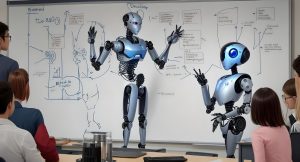” Impact of Artificial Intelligence in Education”

- Artificial Intelligence (AI) is transforming every sector of society, and education is no exception. The integration of AI in education has revolutionized the way students learn, teachers teach, and institutions operate. From personalized learning experiences to automated grading systems, AI is making education more efficient, accessible, and inclusive. Its impact extends beyond classrooms, reshaping the very foundation of how knowledge is delivered and acquired.
- One of the most significant impacts of AI in education is personalized learning. Traditional teaching methods often follow a one-size-fits-all approach, which may not suit every student’s pace or learning style. AI-powered platforms analyze a student’s strengths, weaknesses, and preferences to create customized learning paths. For example, adaptive learning systems like Khan Academy or Coursera use AI algorithms to suggest lessons or exercises tailored to individual needs. This ensures that students can learn at their own pace, improving both understanding and retention.
- Another major contribution of AI is in administrative automation. Teachers often spend a considerable amount of time grading assignments, managing attendance, and handling paperwork. AI tools can automate many of these tasks, allowing educators to focus more on teaching and mentoring. For instance, AI grading systems can evaluate multiple-choice questions instantly and even assess essays using natural language processing. This not only saves time but also ensures fair and consistent evaluation.
- AI has also enhanced accessibility in education. Students with disabilities can now access learning materials through AI-based tools such as speech recognition, text-to-speech converters, and real-time translation. For example, visually impaired students can use AI-powered applications that convert text into audio, while hearing-impaired learners benefit from instant captioning during lectures. These advancements make education more inclusive and ensure that everyone has an equal opportunity to learn.
- In addition, AI enables intelligent tutoring systems that act as virtual teachers or assistants. These systems provide students with immediate feedback, explain complex concepts, and track progress. Chatbots and virtual learning assistants, like those used in online education platforms, can answer questions 24/7, helping students who need extra support outside regular class hours. This continuous assistance enhances understanding and encourages self-directed learning.

- AI also plays a key role in data-driven decision-making. Educational institutions use AI to analyze student performance data, identify learning gaps, and predict outcomes. This helps teachers design better curricula and provide targeted interventions for struggling students. Furthermore, AI assists in identifying patterns in large datasets, helping policymakers improve education systems based on evidence rather than assumptions.
- However, the integration of AI in education also brings challenges. Issues such as data privacy, ethical use of technology, and the risk of over-reliance on machines must be addressed carefully. Teachers must be trained to use AI tools effectively, and systems must be designed to complement human educators, not replace them.
- In conclusion, AI has a profound impact on education by making learning more personalized, efficient, and inclusive. It empowers students, supports teachers, and helps institutions operate more effectively. As technology continues to evolve, the partnership between humans and AI will shape the future of education—creating smarter classrooms and a more informed, capable generation.
Impact of Artificial Intelligence in Education